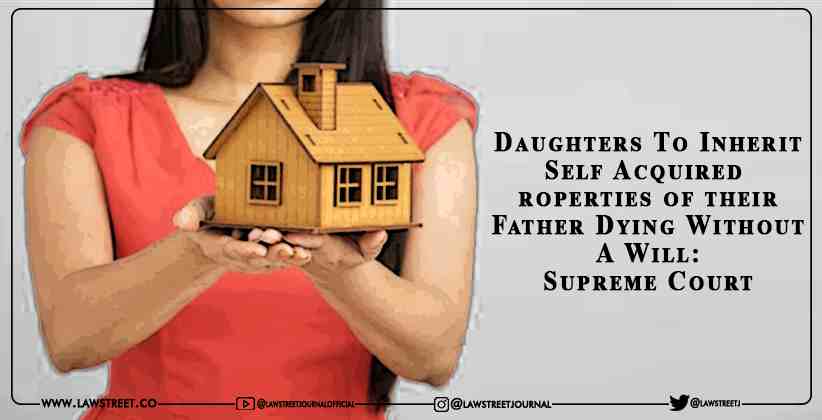The Supreme Court in the case Arunachala Gounder (D) by LRS. Vs. Ponnusamy and Ors. has observed that a daughter is capable of inheriting the self-acquired property or share received in the partition of a coparcenary property of her Hindu father dying intestate.
In this case, the property in question was admittedly the self-acquired property of Marappa Gounder. The question raised by the appellant was whether Late Gounder's sole surviving daughter Kupayee Ammal, will inherit the same by inheritance and the property shall not devolve by survivorship?
The Court was considering the question of whether a sole daughter could inherit her father's separate property dying intestate (prior to the enactment of Hindu Succession Act, 1956).
To answer this issue, the Apex Court bench referred to customary Hindu Law and also judicial pronouncements, observed that the right of a widow or daughter to inherit the self-acquired property or share received in the partition of a coparcenary property of a Hindu male dying intestate is well recognized not only under the old customary Hindu Law but also various judicial pronouncements.
"Right of a widow or daughter to inherit the self-acquired property or share received in partition of a coparcenary property of a Hindu male dying intestate is well recognized not only under the old customary Hindu Law but also by various judicial pronouncements".
The Court noted the following:
- The Mitakshara law also recognises inheritance by succession but only to the property separately owned by an individual, male or female. Females are included as heirs to this kind of property by Mitakshara law. Before the Hindu Law of Inheritance (Amendment) Act 1929, the Bengal, Benares and Mithila sub-schools of Mitakshara recognised only five female relations as being entitled to inherit namely widow, daughter, mother paternal grandmother and paternal great-grandmother.
- The Madras subschool recognized the heritable capacity of a larger number of female heirs that is of the son's daughter, daughter's daughter and the sister, as heirs who are expressly named as heirs in Hindu Law of Inheritance (Amendment) Act, 1929. The son's daughter and the daughter's daughter ranked as bandhus in Bombay and Madras.
- The Bombay school which is most liberal to women recognized a number of other female heirs, including a half-sister, father's sister and women married into the family such as stepmother, son's widow, brother's widow and also many other females classified as bandhus. From the above discussions, it is abundantly clear that a daughter was in fact capable of inheriting the father's separate estate.
- The 174th Law Commission in its report on 'Property Rights of Women' while proposing reforms under the Hindu Law has observed as under- "1.3.3 The Mitakshara law also recognising inheritance by succession but only to the property separately owned by an individual, male or female. Females are included as heirs to this kind of property by Mitakshara law"
Therefore, the court observed:
"From the above discussions, it is clear that ancient text as also the Smritis, the Commentaries written by various renowned learned persons and even judicial pronouncements have recognized the rights of several female heirs, the wives and the daughter's being the foremost of them. The rights of maintenance women in the family to were in every case very substantial rights and on whole, it would seem that some of the commentators erred in drawing adverse inferences from the vague references to women's succession in the earlier Smritis. The views of the Mitakshara on the matter are unmistakable. Vijneshwara also nowhere endorses the view that women are incompetent to inherit"
"If a property of a male Hindu dying intestate is a self-acquired property or obtained in partition of a co-parcenery or a family property, the same would devolve by inheritance and not by survivorship, and a daughter of such a male Hindu would be entitled to inherit such property in preference to other collaterals."
In the case, the court noted that the property in question was admittedly the self-acquired property of Marappa Gounder despite the family being in the state of jointness upon his death intestate. Therefore, his sole surviving daughter Kupayee Ammal will inherit the same by inheritance and the property shall not devolve by survivorship, the bench said while allowing the appeal.






